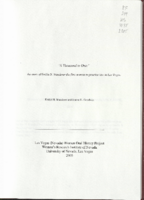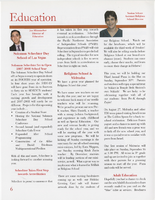Search the Special Collections and Archives Portal
Search Results
Vera Moore (True Beginnings/Divinity House) oral history interview conducted by Kelliann Beavers and Elia Del Carmen Solano-Patricio: transcript
Date
Archival Collection
Description
From the Lincy Institute "Perspectives from the COVID-19 Pandemic" Oral History Project (MS-01178) -- Community organization interviews file.
Text
Maxine and Jack Cason oral history interview: transcript
Date
Archival Collection
Description
Oral history interview with Maxine and Jack Cason conducted by Claytee D. White and Stefani Evans on September 22, 1016 for the Building Las Vegas Oral History Project. In this interview, Jack discusses his early life in Oklahoma and arriving to Las Vegas, Nevada in 1950. He recalls the formation of Saveway Super Service, Philips 66 service stations, the competition in the fuel industry, and the opening of the first Rebel service station. Jack talks about fuel terminals, fuel bulk plants, and becoming one of the largest fuel providers in southern Nevada. Later, Maxine and Jack talk about supporting local sports organizations. Lastly, Jack discusses his involvement in the University of Nevada Las Vegas (UNLV) Athletics Department, and being inducted into the UNLV Sports Hall of Fame.
Text

Antioco Carrillo interview, 2019: transcript
Date
Archival Collection
Description
Interviewed by Monserrath Hernández, Rodrigo Vazquez, and Laurents Benitez-Bañuelos. A native of Jalisco, Mexico, moved to Las Vegas when he was about 20-year old in 1987. Attended CSN and UNLV. His history with Las Vegas is embedded in the 1980s Las Vegas gay scene and education for AIDS. He is and activist and the Executive Director of Aid for AIDS of Nevada. He and Theodore Small are the first same-sex marriage in Nevada.
Text

Transcript of interview with Emilie Wanderer by Joanne Goodwin, 2000
Date
Archival Collection
Description
Emilie Wanderer was the first woman to establish a law practice in Las Vegas. She also helped to start a family court in Nevada with a social worker and a marriage counselor on staff. She and her son John were the first mother-son team to practice law in Nevada.
Text

Transcript of a narrative by Lucile Bunker, March 10, 1977
Date
Archival Collection
Description
Text

Meeting minutes for Consolidated Student Senate, University of Nevada, Las Vegas, January 3, 1984
Date
Archival Collection
Description
Text

Christian Chan oral history interview: transcript
Date
Archival Collection
Description
Oral history interview with Christian Chan conducted by Cecilia Winchell, Jerwin Tiu, and Stefani Evans on May 06, 2022 for the Reflections: the Las Vegas Asian American and Pacific Islander Oral History Project. In this interview, Chan begins by describing her childhood in Hong Kong and later moving to San Francisco, California with her family, then to Las Vegas, Nevada in 1965. She recalls attending Sunrise Acres and Roy Martin Middle School before graduating from Valley High School as valedictorian. In college, Chan attended the University of Nevada, Las Vegas (UNLV) and graduated with a degree in engineering. After college, she found work in the Las Vegas Valley Water District and became the first woman engineer. During her five years there, she excountered subtle sexism for the first time. Chan continues the interview by describing her work while she lived in California, as well as her years internationally living in the Philippines as well as Ecuador. Throughout the interview, Chan touches on topics ranging from identity, to her impressions of the different generations, discrimination, and the growth of Las Vegas.
Text

Sanje Sedera oral history interview: transcript
Date
Archival Collection
Description
Oral history interview with Sanje Sedera conducted by Kristel Peralta, Cecilia Winchell, Ayrton Yamaguchi, and Stefani Evans on April 16, 2021 for Reflections: The Las Vegas Asian American and Pacific Islander Oral History Project. Sanje Sedera discusses growing up in Sri Lanka, formerly Ceylon, with his family. He shares his educational history, moving from Sri Lanka to Darwin, Northern Territory, Australia as a high schooler to learn English before immigrating to the United States to attend Idaho State University. Sedera discusses the political unrest and civil war that took place in Sri Lanka between the Tamil and Sinhalese people, and how he grew to appreciate political activism instilled in him by his paternal grandparents. Sedera shares his employment history working as a manager for K-Mart, an opportunity that brought him to Las Vegas, as well as his entrepreneurial pursuits of owning a mortgage business and becoming a realtor. He talks about the financial crisis of 2008 that led to losing his business, his attempts to run for public office, and how he helped to form Nevada's Asian American Democratic Caucus. Sedera concludes with a discussion of his Buddhist practice and how these philosophies have shaped his life.
Text

Transcript of Interview with Michael Drakulich by Jane Finfrock, May 8, 1979
Date
Archival Collection
Description
Text

